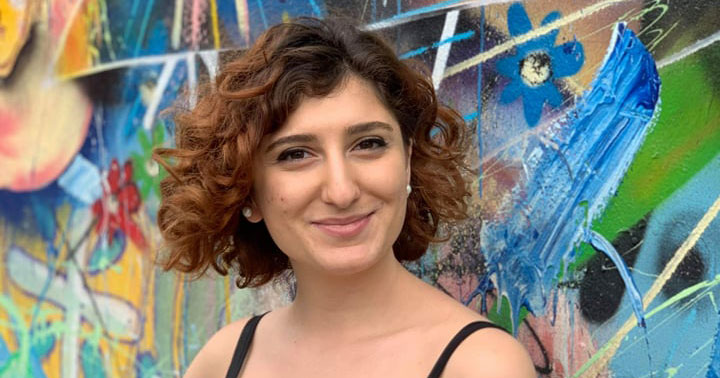Rencontrez Lida Minasyan, boursière en matière de subventions
Leader d'une association à but non lucratif, membre de l'Atlas Corps, grande sœur. Dans cette nouvelle interview, découvrez ce qui a poussé Lida Minasyan à devenir une militante des droits des femmes et comment son travail au Fonds mondial pour l'enfance a façonné sa carrière.

Lida, peux-tu nous parler de tes origines et de ton parcours ?
Bien sûr ! Je viens d'Arménie. Je suis assistante sociale de formation et professionnelle des droits humains ; j'ai obtenu un master en droit des droits humains. Je milite pour les droits des femmes depuis l'âge de 19 ans, car les stéréotypes sexistes ont commencé à me perturber dès l'école.
En 2012, j'ai rejoint une organisation appelée Société sans violence, une ONG qui œuvre pour la protection des droits des femmes. Cette organisation m'a beaucoup aidée – à grandir, à apprendre et à exercer – et m'a offert un espace et des opportunités en tant que jeune féministe curieuse. Plus tard, on m'a proposé le poste de directrice générale de l'organisation, un défi que j'ai relevé avec passion et responsabilité. Mon travail consistait à plaider pour l'intégration de l'éducation au genre dans les programmes scolaires du secondaire, pour l'adoption d'une législation sur la violence domestique en Arménie et pour l'implication des femmes dans les processus de consolidation de la paix.
Lorsque j’ai réalisé que j’avais besoin d’une nouvelle expérience internationale, j’ai postulé à l’ Bourse du Corps de l'AtlasJ'ai eu la chance d'être sélectionné par le Fonds mondial pour l'enfance. Je suis arrivé ici et je suis très heureux d'avoir pris cette décision !
Nous sommes ravis de vous compter parmi nous ! Un moment particulier ou une expérience personnelle vous a-t-il inspiré à œuvrer pour les droits des femmes ?
Il y avait une jeune joueuse de tennis extraordinaire qui était notre voisine. Mariée très jeune, elle a dû abandonner le sport pour devenir femme au foyer. Quelques mois seulement après son mariage, elle revenait chez elle, meurtrie, et racontait à ma mère les violences subies de la part de son mari. J'avais 12 ans à l'époque, et ces conversations m'ont profondément marquée. Elles suscitaient colère et sentiment d'injustice. Cela m'a vraiment fait réfléchir à la nécessité d'agir. Lorsque j'ai eu l'opportunité de m'engager dans le militantisme pour les droits des femmes, j'ai senti que j'étais au bon endroit, car c'était ce que je recherchais.
Pouvez-vous nous parler de votre travail au Fonds mondial pour l'enfance (GFC) ? Comment pensez-vous avoir influencé le GFC pendant votre mandat, et comment le GFC vous a-t-il influencé ?
Ce qui a été très précieux pour moi au GFC, c'est d'avoir toujours été de l'autre côté, du côté des ONG. Être de ce côté et observer le fonctionnement d'une organisation donatrice m'a beaucoup appris. Je connaissais les défis d'une ONG, mais une organisation donatrice est confrontée à de nombreux défis similaires, se situant entre l'octroi de subventions et la nécessité d'en obtenir.
L’une des choses que j’ai faites est le rapport d’évaluation d’impact de la crise financière mondiale. Prix Maya Ajmera pour le développement durableIl s'agit d'un prix unique, que nous décernons depuis 2005. Dans le cadre de cette évaluation d'impact, j'ai interagi avec les organisations financées par GFC de 1997 à 2018. J'ai ainsi pu suivre l'histoire et l'évolution de GFC à travers ces organisations. J'ai énormément appris en si peu de temps grâce à cette recherche.
Cela illustre l'importance de GFC dans le développement de ces organisations. Les partenaires bénéficiaires sont très demandeurs de l'accompagnement et du soutien que GFC leur offre, et c'est ce qui fait sa singularité. Nous pouvons être fiers de nous et nous efforcer de nous améliorer, toujours plus. J'apprécie beaucoup la période que je traverse à GFC, car elle est riche en nouveautés et en développements positifs !
Comment diriez-vous que votre travail chez GFC s’inscrit dans votre trajectoire professionnelle ?
Comme je l'ai dit, le GFC m'a beaucoup aidé à comprendre le point de vue des donateurs. J'ai eu l'occasion de mener davantage de recherches, de préparer des dossiers de projet et de travailler sur la stratégie régionale d'octroi de subventions pour le portefeuille Europe et Eurasie, ce qui m'a été très utile. J'ai appris des relations avec les donateurs auprès de l'équipe de développement et des interactions avec les partenaires bénéficiaires auprès de l'équipe des programmes.
Quelle est la prochaine étape après la crise financière mondiale ?
Je me réjouis de ma future collaboration avec le GFC et suis heureuse de poursuivre mon engagement en faveur des droits des femmes dans ma région. À l'avenir, j'espère mettre en place des mécanismes innovants pour briser les stéréotypes de genre en ciblant les adolescents et les jeunes.
#Faits amusants sur Lida
Quel est votre souvenir d’enfance préféré ?
Mon frère est mon plus beau souvenir d'enfance. J'ai six ans de plus que lui et j'adorais lui apprendre des choses et jouer avec lui.
Que voulais-tu faire quand tu serais grand ?
J'en ai toute une liste ! Je voulais être chirurgien, psychologue, biologiste, enseignant, avocat, économiste et philosophe.
Si vous pouviez avoir un super pouvoir, quel serait-il ?
Un super pouvoir pour avoir tous les super pouvoirs possibles, quand je le souhaite ?
Quel est votre endroit préféré parmi ceux que vous avez visités ?
Rio de Janeiro !
Lida est également récipiendaire de la bourse William Ascher du GFC, un programme créé en l'honneur de notre président fondateur et champion de longue date, le Dr William Ascher.
